
The exemplary mentors and advisors celebrated here have much to offer all of us. These initial insights and comments are primarily introductions to their lives and the personal “messages” provided through their diverse contributions.
As we all know, “Our actions speak better than words…”
Those honored here are exemplary mentors and advisors, and each has significantly and consistently supported the personal and professional development of others. In a university setting, these efforts will have included students and colleagues; in industry, government, or service organizations, they will have included a variety of developing personnel.
Beginning with the first award in April 2005, the program is designed to celebrate annually those who have enduringly engaged minds, elevated spirits, and stimulated best efforts. It also aspires to help spread the virtues of excellent mentoring and advising in the engineering and applied sciences community – just as these individuals do!
Titles and affiliations are listed as at the time of each contribution. For additional information, each institutions’ own web site and directory listings should prove helpful.
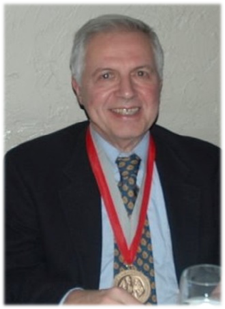
Amedeo R. Odoni, Ph.D.
Professor,
Department of Aeronautics and Astronautics,
and Professor of Civil and Environmental Engineering,
School of Engineering, MIT
“The Capers and Marion McDonald Award for Mentoring and Advising addresses a very critical need in today’s academia. Distinguished research universities have made major progress in recent decades toward standardizing and expanding the advisory support and services they provide for their undergraduate students. But there is still much room for improvement when it comes to the mentoring and advising of graduate students and of junior (pre-tenure) members of the faculty. The mentoring and advising of people in these stages of their careers requires a very significant investment of time, effort and thought by the advisors and mentors, as it must be tailored to the particular circumstances of each of the individuals involved. University administrators and department heads sometimes fail to underscore to their senior faculty the importance of engaging seriously in the mentoring and advising process and to give credit for such engagement. Yet, good advising and mentoring is an indispensable complement to a rigorous recruiting and selection process as a means of elevating the quality of graduate degree programs and of academic institutions. Equally important, good advising and mentoring is essential to the well-being and eventual professional fulfillment of people in these early stages of their careers.
“The personal rewards that one derives from being a dedicated advisor and mentor are rich. Some of the happiest recollections of my almost 40 years on the MIT faculty are associated with receiving news of the achievements of many of the students and colleagues I have advised and mentored. There is immense satisfaction in learning that a former advisee has been promoted or named a department head or dean of a school, that someone helped has received a major professional award or that another has been elected a fellow of a professional society or a member of a national academy. The pleasure is even greater when I can recall important breakthrough decisions that these individuals may have made at some point in their careers with some contribution from me. But the occasions I most relish are the ones in which a former student that I have not seen in 10, 15 or 20 years calls or sends a message asking for advice on whether to accept a job offer, make a career change or even get married! Once a mentor and advisor, always a mentor and advisor.
“It was also gratifying to see our new Dean of Engineering [Dr. Subra Suresh] there, who made it despite an extremely busy schedule. His presence clearly reflects the importance that the School of Engineering attaches to advising and mentoring. I thought I would share with you the message that I sent to (then) Dean of Engineering Tom Magnanti…when he informed me that I had won…
“I am very honored to receive the Capers and Marion McDonald Award. Advancing the professional and personal development of students and colleagues through advising and mentoring is (or should be) one of the most important duties of a faculty member. During my 40+ years as a student and then faculty member at MIT, I have been the beneficiary of a great faculty advisor and then informal career mentor, the late Al Drake of the EECS Department. In that time span, I have also seen the School of Engineering make enormous progress in the area of junior faculty mentoring, thanks to the inspired leadership of a succession of Deans and of many Department Heads. But there is no room for complacency, as there is still plenty of room for improvement. Thank you all!
“I also wish to thank you for the lovely and so thoughtfully designed medal. It will be displayed prominently in my office and its copy in our apartment in Athens…”
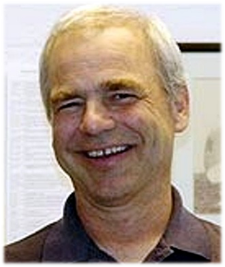
William P. Ball, Ph.D.
Professor,
Department of Geography and Environmental Engineering,
Whiting School of Engineering, Johns Hopkins University
“I believe that my award stemmed in large part from my work with the Engineers Without Borders students, and I must say that I feel equally much the mentee as the mentor. These students are all volunteers dedicated to making a difference, and I learn from them each day about how hard work and dedication can go a long way toward getting a job done. (I think the old adage is that most jobs require 10% inspiration and 90% perspiration — these students remind me daily of this.)”
From Johns Hopkins Engineering student, and Engineers Without Borders volunteer, Claire Kenney: “There I was, standing in front of the entire student body of the Zakhe Agricultural College in Kwazulu-Natal, South Africa, watching as a beaded, colorful neck tie was placed around Professor Ball’s neck. I, along with the fellow members of The Johns Hopkins University chapter of Engineers Without Borders (EWB), South Africa team, had been called to the front of the small auditorium/lunchroom to receive the thanks of the students and faculty for our work on our fourth successful trip to the area. Naturally, the principal, Richard Dladla, singled out Professor Ball for his unwavering, earnest dedication to serving the surrounding communities though sustainable engineering projects as faculty advisor to EBW-JHU. Richard Dladla went on to mention how Professor Ball, in a moment of anxiety, once asked if they had made a difference in the communities. Richard Dladla spread his arms, looked around, then looked back at Professor Ball and said, ‘We are all here because of you. We are proof you have made a difference.’ Professor Ball was then presented with the beaded tie. Now a light shade of pink, Professor Ball looked down at his shoes slightly sheepishly, but with a wide smile on his face.
“As I looked at Professor Ball, I thought of how fitting that remark was. Richard Dladla was likely referring to the students, faculty, and staff’s involvement in our projects and the communities, thanks to Professor Balls’ untold efforts. However, I knew that that remark was also true in reference to the difference he has made to every member of the EWB-JHU team. His endless negotiating, advising, networking, organizing, encouraging, instructing, efforts have inspired, motivated, and activated us to install two ram-pumps during each of the past two summers and another one during this past Intersession trip. These pumps are serving to irrigate gardens that support orphans in the area.
“On a more personal level, though, he has been a mentor to all of us. We are all students who want to use their knowledge and skills to help those who need it, in lasting ways. He has helped us realize how we can do that, and not just as students, but as life-long, responsible members of the world. His mentoring has led to several different student research projects concerning the functioning and impact of the pumps. At his encouragement, students have applied for and been awarded grants and scholarships toward endeavors including and beyond our EWB projects. All under the guidance and direction of Professor Ball, our members have taken leadership positions, have aggressively fundraised, have dedicated their sparse spare time to making our projects possible. What’s more, he has reached out to each of us, encouraging future engineers, non-engineers, freshmen, graduate students, old members, new members alike, and made us feel part of the effort and want to do more for it.
“Standing in front of the Zakhe Agricultural School and watching Professor Ball’s gracious modesty made me gain an inkling of how many people he has brought together and how many people have benefited from his dedication, perseverance, and guidance. Furthermore, considering that he does all this as a willing volunteer on top of all his teaching and research duties, is compelling to me. It made me realize that I have the capability and therefore the responsibility to continue to help others throughout my life, even if it is already busy and full with other endeavors. He has inspired both those in South Africa and at JHU to join his efforts to make the impossible possible and become a reality. So, given the extent and scale of his impact as a mentor, I ardently advocate Professor William Ball’s nomination to the Excellence in Mentoring Awards.”
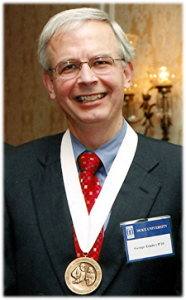
George A. Truskey, Ph.D.
Professor and Chair,
Department of Biomedical Engineering,
Pratt School of Engineering, Duke University
“The most important parts of mentoring are that you are actively interested in your students and their future, you listen to them and treat them as partners in scholarship and education, and you provide them opportunities to grow as students and individuals.
“Although I am a department chair, I always make time to meet with students in my class or my lab. I let them explain their problems or plans and ask them to explain their reasoning. My goal is to be sure that they explore various options so that they can develop a suitable solution. Sometimes this takes time, so I always encourage them.
“I also provide students with opportunities to grow, whether that is a chance to give a lecture, or present their work at a conference, know about a position opening or provide a reference.”
These are some of the nominating statements from the letter Prof. Truskey’s graduate students submitted:
“We have been continually impressed with Dr. Truskey’s dedication to the academic, professional, and personal development of each of his students. His involvement in numerous dissertation committees, both as chair and as a member, shows not only that he himself believes in serving as a mentor, but also that students turn to him for solid counsel. As chair of the largest engineering department at Duke, Dr. Truskey takes on the responsibility of listening to upper administration, faculty, and students.”
“Dr. Truskey is approachable and known for his ‘open-door’ policy, which has not wavered despite his many responsibilities. …The consistent, open line of communication has created a supportive environment for research and scholarship. Furthermore, Dr. Truskey provides his students with collaborative opportunities, within the institution and outside at national conferences. He is interested not only in the immediate aims, but also in our future careers and gives us tools to reach those goals.”
“It takes someone with great discipline and solid character to always ‘do the right thing,’ a phrase that has been used to describe Dr. Truskey numerous times. We believe that, ultimately, he upholds the best interests of Duke, the graduate school, the Pratt School of Engineering, the Biomedical Engineering Department, and each of its students.”
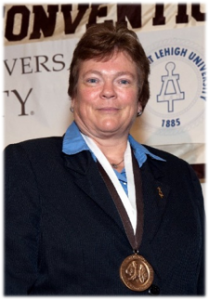
Donna S. Reese, Ph.D.
Professor and Associate Dean for Academics,
Department of Computer Science and Engineering,
Bagley College of Engineering, Mississippi State University;
Mississippi State, Mississippi
“I find mentoring to be one of the most rewarding and frustrating parts of working with students. I get no greater reward than seeing a student mature and grow into a responsible adult and no greater frustration than seeing a student repeatedly ignore advice and guidance and fail where I know they could succeed. Fortunately the successes far outweigh the frustrations and I just remind myself of that when I am frustrated.
“I believe the most important skill that a mentor can have is listening. In many questions there is not a right or wrong answer and a mentor cannot possibly tell a student what is ‘best’ for them. A mentor can listen and ask probing questions and help a student to find the right answer for themselves.
“I hope that some of the students who I have mentored will, in turn, mentor others in their careers.”
And, “I was again reminded of your and Marion’s generosity as I proudly wore my medal at commencement last week.”
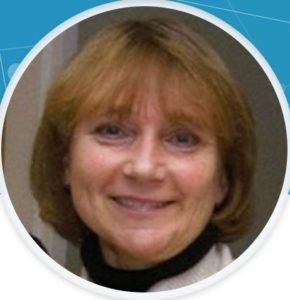
Cathy Jancuk
Undergraduate Program Manager,
Department of Biomedical Engineering,
Whiting School of Engineering, Johns Hopkins University
“I have been an academic advisor in the Department of Biomedical Engineering for 27 years. In that amount of time, I have worked with approximately 2,500 students to help them navigate academics, campus life, and everything in-between. In the early days of my career as an academic advisor, I was fortunate to work with two of the most amazing mentors at Johns Hopkins. They were instrumental in helping me understand the importance of the role we play in the lives of the students we have the pleasure to work with each day. I learned that if you take time to listen and ask the right questions you will undoubtedly help someone see all of the possibilities.
“It is a joy and a privilege to step foot onto campus every day because of the wonderful interactions I have with our students. The small gestures and navigational help I provide seem to be paid back one thousand times over when students share the news of starting an exciting research internship, acceptance into a top medical program, or landing a dream job. I am always surprised when an alumnus tracks me down to tell me that I was instrumental in getting them through school even though I tell them that they did all of the hard work to make that happen. That is when I realize that the small gestures to help students see the possibilities are really quite important. This award serves as a wonderful motivator for me to continue the role I play in our student’s lives.“
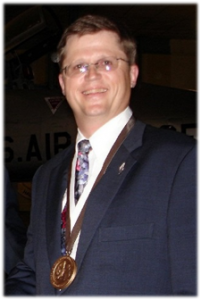
Carter J. Kerk, Ph.D., P.E. – First Tau Beta Pi Honoree
Associate Professor,
South Dakota School of Mines and Technology;
Rapid City, South Dakota
“I have had the good fortune to have received excellent mentoring during my career. Thinking back and pondering what made my mentors effective and special for me, I believe it was that they took time out of their busy schedules and took an interest in helping. They treated me as an adult and helped me feel good about myself and my career. It started with my parents, Rosalee and Willard Kerk. A significant early mentor was Don Criswell, a farmer I worked for during my teens. I had many great high school teachers, but the most notable mentors were Jim Curtiss, Gary Spear, Dennis Van Winkle, Joyce Jessen and Ed Miller. Again, I had many great college professors, but the most memorable mentors were Michael Riley and David Cochran from the University of Nebraska and Don Chaffin from the University of Michigan.
“Over my years as a professor, I have had the privilege to serve as an academic advisor for scores of undergraduate and graduate students. This has been a great pleasure for me. After doing this for several years, I discovered that my approach to academic advising was really mentoring. An academic advisor helps a student select courses. A mentor takes a more holistic approach to the development of the student. Of course, every student is different, but I find an effective session takes about 20-30 minutes. In addition to scheduling courses, I ask the student to tell me a little about how they are progressing in current classes. I ask them to tell me a little bit about how their life is going with school, family, work and career. Often, these discussions lead to ideas for self-improvement or career development, such as trying new study habits, getting more involved in a professional society, or searching for a summer internship. And the process doesn’t end at graduation. Many of our graduates stay in touch and seek advice and mentoring support as their careers develop.”
The following are two quotes from Prof. Kerk’s nomination package for the Tau Beta Pi McDonald Mentoring Award:
“Dr. Kerk helped me transition from being an EE student to an IE student. He helped me set up my schedule for the following two years in one afternoon, and made it possible for me to switch majors and still graduate in four years. He is always willing to drop everything if any one of his students needs assistance, and makes each student feel important. Students from other majors enjoy taking his classes because he makes each topic interesting and helps students apply the principles to real world applications through various community projects. Dr. Kerk is an excellent teacher and mentor and SDSMT is fortunate to have him.” – Roy Gullickson, Industrial Engineering Senior, graduated in May 2006 and went to work for Rockwell Collins, Inc.”
“Dr. Kerk is not my academic advisor, but I have seen him every semester to ensure that I am on track to graduate. I also stop by numerous times each month to seek Dr. Kerk’s advice and counsel. He was instrumental in my decision and acceptance into the PhD program at the University of Arkansas. I spoke with him extensively about my after-graduation plans and he graciously offered me access to his plethora of contacts within the Industrial Engineering community. Dr. Kerk puts his home phone number on class syllabi and actually encourages students to call him at home if they are having trouble in a class or need help making a crucial decision in their lives. I have also had the opportunity to work with him as an advisor to our local Institute of Industrial Engineers chapter. He is constantly looking out for our local chapter and serves as a mentor to all members. Dr. Kerk opens up his home to host officer transition meetings twice a year and he is always supportive of IIE activities.” – Jen Pazour, Industrial Engineering Senior, graduated in May 2006 and immediately began a Ph.D. program at the University of Arkansas.”
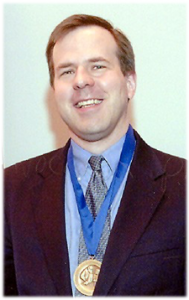
Todd C. Hufnagel, Ph.D. – First Johns Hopkins Honoree
Associate Professor,
Department of Materials Science and Engineering,
Whiting School of Engineering, Johns Hopkins University
“Fundamentally, mentoring involves helping students or others find in themselves what they need to succeed. But students, particularly younger ones, sometimes have not fully thought through what they want to achieve or what it means to be ‘successful.’
“So early on in any mentoring relationship, I try to encourage the student to be introspective – to try to achieve some insight into his or her own emotions and values. The idea is to help the student fashion a definition of success that works for him or her, something that will ultimately lead to a happy and fulfilling life.
“One example of this in my own experience was a student who I could tell was fundamentally very bright but was struggling in his engineering classes. In the course of many conversations, it came out that in studying engineering he was trying to live up to the expectations of his parents. But in doing so he was making himself miserable because he really didn’t enjoy the work. He struggled for quite a while before coming to the realization that, for him, to be successful meant finding fulfillment through working with children. Ultimately, he decided to drop out of Johns Hopkins and enroll in a different college to pursue a teaching career. The last time I saw him, he was much happier than I had ever seen him previously. I can’t take any credit for the hard, emotional work involved – he did all of that for himself. But I like to think that my small role, in encouraging him to be introspective and find the courage to change his career path, was significant.”
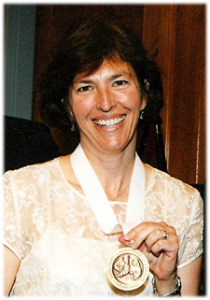
Linda P. Franzoni, Ph.D.
Associate Professor,
Department of Mechanical Engineering,
Pratt School of Engineering, Duke University
“I believe that every successful person, no matter what area they work in, can point to at least one person in their life who has supported, influenced, helped or encouraged them along the way. As social human beings, we rely on each other in a variety of ways both large and small.
“When I think back on my own life, professionally and personally, I can identify a handful of individuals who have been that support person or mentor for me. What I have appreciated in my own mentors is their ability to relate to me, to relate to what was going on in my life, and to appreciate my experiences, knowledge, or lack thereof, at crucial moments in my life.
“When I reflect on the mentors in my life, the one who stands out foremost in my mind is from my undergraduate years. This professor did not laugh at my crazy ideas; instead he encouraged me to pursue them. At my graduation he told me if I ever needed a reference to contact him no matter where I was, and to my surprise, he told my parents about a project that I had done my freshmen year. Without this professor’s assistance, I would not have gotten my first job in engineering. In all my professional endeavors – as an engineer for NASA, a graduate student, or a faculty member – I have had co-workers, bosses, faculty advisors, colleagues, friends, and family members who have encouraged, supported, and helped me through various aspects of my life and my job. Of all those people who have touched my life, that special undergraduate professor who remembered my freshmen windmill project and helped jump-start my career has had the most lasting effect of all.
“As a college professor, I now think of how my own life was influenced by the professors that I have had and I take that responsibility very seriously. I feel privileged to be in a position that can have an effect on the life of a young person. I know that for some students it is the example that I set that will make a difference for them, whereas for other students it could be a conversation or simply just taking the time to show I care. I hope that some day one of my former students will be able to look back on their undergraduate or graduate school days and say that I was that special professor that had a profound impact on their life.”
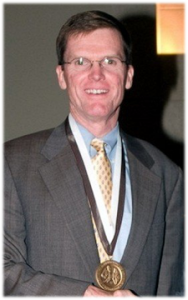
Thomas C. Sheahan, Sc.D., P.E.
Professor and Chair,
Department of Civil and Environmental Engineering,
College of Engineering, Northeastern University;
Boston, Massachusetts
“A good mentor is a good listener and has to be a bit of an amateur psychologist in some ways. You have to listen to what the mentee is saying about how they are thinking about a problem, whether that is realistic, and whether there are alternatives that s/he hasn’t thought about.
“Mentoring seems to run across a range of extremes. At one end (and this is strictly my personal style, and obviously doesn’t apply to all mentors) is the in your face, challenging, let’s get real, approach. At the other end, mentoring can consist of just going about your daily work, with mentees observing you and modeling parts of their behavior on what you are doing. So, there are mentors out there who don’t even know they’re mentoring, simply by being a role model or example.
“Most students enter engineering studies without any concept of what it entails. They’re told that they’re good in math and science, so that’s the path they ‘should’ pursue. However, as for many professions, there’s a sense that engineering is a club that students are trying to join, leading many to insecurities about their aptitude and ability to ‘fit in.’ In addition, many are uncertain about how to make the best decisions in their studies and career path. In both of these areas, aptitude-fit and decision making, I see mentoring as very important.
“This doesn’t end when engineers complete their undergraduate programs. Both students and professionals need and often want a connection – who is out there who will anchor me, provide some advice, give me some ‘what if’ scenarios, brainstorm with me about alternatives, care about what I’m thinking and considering? They don’t want to be placated or pacified, necessarily – they may be getting enough of that from their parents and friends. Mentoring may include ‘getting real,’ challenging students and young professionals to be better, to take the next step, to push beyond boundaries defined by their insecurities, etc.
“For some, the mentoring they need may be helping them to get grounded – examine their strengths and weaknesses, whether their expectations are realistic. Some students are not very realistic about their abilities and the world they’re studying or working in, and may start to make decisions about their future based on some very unrealistic assumptions. This isn’t about dragging them down; in engineering-speak, it’s about getting them to be good problem solvers based on realistic input.
“Some inspirational, motivating outcomes that I have enjoyed include the following:
“An undergraduate student in Tau Beta Pi who became a Naval officer, then went on to law school. He wrote to me after almost 10 years to thank me for being a role model; he had joined the Navy based on my experiences.
“Another undergraduate student who struggled academically and socially. Repeatedly discussed leaving the program. Graduated and is now a project engineer for Turner Construction.
“A very shy, quiet student who has struggled, partly due to a learning disability. He is now thinking about grad school, but has usually been miserable in school. However, during co-op work periods, he excels in engineering intern jobs. I’m currently advising him to work for a while, gain some confidence, learn more about how he learns best before returning to try to learn more. I challenged him to think about the following: does he really need a grad degree to pursue his path (which is undefined)?
“Student at graduation time, introducing me to his/her parents. The student said, ‘I wouldn’t have graduated without your help,’ and I never even knew that I done anything extraordinary for this student.
“My own mentors have had very positive impacts:
“Like most good mentors, most of my memorable mentors probably didn’t even know they had that role in my life. I observed how they conducted themselves, how they approached their work, how it differed from the way I was doing things, and what I could adopt that would make me do better at work and in life. I was fortunate to have two parents who were really good mentors – they certainly taught me to have a positive attitude toward work, to love what I do, to be challenged, and to value those I work with, particularly those working for me or in roles that are often unappreciated (the janitor of the building, the admin assistant, etc.). The other mentors that stand out are my graduate advisors, both of whom pushed me to go to the next level, to take on problems that seemed beyond my abilities, and to pay attention to details. Now, I have a mentor, but again, I’m sure that he doesn’t know he serves in that role – he’s my co-advisor of a student group and also our department co-op coordinator. He is tremendously helpful in my interactions as department chair, where the issues are political and administrative, and often personality-driven.”
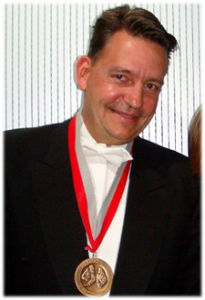
Olivier L. de Weck, Ph.D.
Associate Professor of Aeronautics and Astronautics,
Department of Aeronautics and Astronautics,
School of Engineering, MIT
“An issue I care deeply about is advising and mentoring. I spend a lot of time with my students to make sure that their undergraduate and graduate education is of a truly transformative nature. Perhaps the greatest honors I received in this respect were the Institute-wide 2006 Frank E. Perkins Award for Excellence in Graduate Advising and the 2010 Capers and Marion McDonald Award for Excellence in Mentoring and Advising.
“My philosophy in advising and mentoring is relatively simple: 1. Challenge, 2. Patience and 3. Honest Feedback. Let me briefly expand on each of these three elements:
“1. Challenge: I have a habit of giving my advisees difficult problems to solve. These problems may seem insurmountable at first but after chipping away at the challenge for a little bit I can see that they start to gain self confidence which leads to increased problem solving skills and appetite. The important part of challenging is to go beyond what you think you can do today. Reach for something new, something unexpected beyond your current horizon.
“2. Patience: It is not realistic or healthy to expect immediate results. Good solutions and new ideas require a certain incubation period that cannot be accelerated by exerting too much pressure or displaying impatience. I have a reputation for being a very patient advisor because I believe that every student works optimally at a different operating pace. Some students are fast, efficient and get things done quickly. Others require more thinking time and may go down an impasse or – “fox hole” – as we say. Overcoming and retreating from such intellectual cul-de-sac’s is an important learning mechanism.
“3. Honest Feedback: It is important to praise excellent research and work, but also to provide well founded and deep critique when necessary. Most students yearn for such honest feedback and want to know where they stand and what the strengths and weaknesses of their own work are. Such feedback acts as a closed-loop control mechanism that leads to better and better results over time. I also occasionally use peer feedback, but rather sparingly, since peer feedback is quite different from advisor and mentor feedback.
“I enjoy teaching and hope that students enjoy learning in my classes. One of the important factors in 21st century teaching is the development and application of active learning techniques, which means engaging students in real time through in-class games, discussions and concept questions. By carefully balancing lectures, case studies and relevant homework, and by constantly refreshing course materials with new research results, we keep things fresh and improve from year to year. My industrial experience and personal energy allow me to work particularly well with the System Design and Management (SDM) students. With an average age of 34 and typically 10 years of work experience they represent some of the most rewarding, but also challenging, students we have at MIT.
“My main focus in teaching has been to achieve excellence and innovation in graduate systems engineering education. I believe that the traditional sharp distinction between ‘engineers’, ‘managers’ and ‘scientists’ is no longer helpful and maybe it never was helpful. Engineers have to learn how to manage their time, financial resources and teams to implement their inventions more effectively. Managers need to have deep technical knowledge and be creative to achieve success in an increasingly competitive global marketplace. Scientists need to interact with others and work in large teams to a greater extent than ever before as they probe the unknown.
“At the undergraduate level I embrace the Conceive-Design-Implement-Operate (CDIO) curriculum that has transformed engineering education in many universities around the world. I believe that systems engineering and engineering design education is most effective when it is not only theoretical, but when it is carefully combined with design-build projects. I have contributed to systems projects of this nature in Unified Engineering as well as through a new class on Engineering Design and Rapid Prototyping. Since 2008 I have created and taught a number of new classes, in part because I saw an increasing need for unifying ways of teaching systems concepts to our engineering students. One of the biggest challenges going forward is how to blend real-time teaching, individual learning with the help of online materials, and one-on-one and group mentoring to achieve the best possible learning outcomes. We have to recognize that the best solution is not a one-size-fits-all approach, but that individual students have their own learning styles.
“One of the most exciting events for me since 2007 was the creation of a new Graduate School of System Design and Management (SDM) at Keio University in Japan. This program is inspired by MIT’s SDM program and I was fortunate enough to be invited to help in its creation as an advisor and instructor. I am particularly proud of the new Active Learning Project Sequence (ALPS) course that we created and that is being taught annually in a series of intense workshops. Especially since the unexpected death of my co-instructor and friend Prof. Kos Ishii of Stanford University at age 51 in March 2009 I feel compelled to maintain the momentum of ALPS and to expand the good relations between MIT and Keio University…
“This is a brief summary of my teaching, advising and mentoring philosophy. How do I know it’s working? Many of my alumni in academia and industry have fulfilling careers and regularly stay in touch. This is one of my greatest joys.”
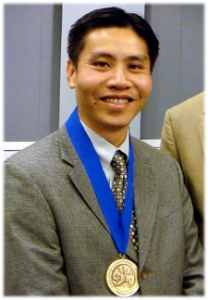
Trac D. Tran, Ph.D.
Associate Professor,
Department of Electrical and Computer Engineering,
Whiting School of Engineering, Johns Hopkins University
The following are excerpts from the letters of nomination for Dr. Tran to receive the 2009 McDonald Mentoring Award at the Whiting School of Engineering:
“There are many researchers who have great knowledge and research skills, but it is not often that they are also organized, good communicators, and helpful to their students.”
“I would not be a Ph.D. student without the guidance that Dr. Tran provided during my undergraduate years at Johns Hopkins. He always made sure to treat each and every student with respect and courtesy, even when we were mere freshmen. He was always available and patient when students came to him for help. It was evident that he cared deeply about the success of every student in his class — he made sure to personally reach out and work individually with struggling students.”
“In mentoring students, Dr. Tran has weekly meetings with each student and also has a weekly group meeting to help us improve our presentation skills. I am very indebted to Dr. Tran’s consideration about his students’ future careers.”
“He provides a mature and reasoned voice during the inevitable difficult periods when obstacles are encountered during research, and he is always accessible to his students and sincerely interested in their progress. He encourages and supports a two-way dialogue between himself and his students and provides a supportive environment for them to pursue their interests.”
“Dr. Tran not only taught me the academic knowledge and problem-solving skills, but more importantly gave me the spirit — the courage — to face unknown fields. He is my life mentor and has profoundly influenced my career and my life,”
“Professor Tran’s commitment and positive attitude is something that should be cherished and rewarded.”
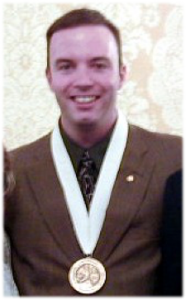
Michael R. Gustafson II, Ph.D. – First Duke Honoree
Assistant Professor of the Practice,
Department of Electrical and Computer Engineering,
Pratt School of Engineering, Duke University
The following are excerpts from remarks by Pratt School of Engineering Associate Dean Linda Franzoni on April 23, 2005, when introducing Dr. Gustafson to receive the first McDonald Mentoring Award at any institution:
“Last year when I solicited nominations from the students for the one and only faculty award that recognized undergraduate teaching – I got flooded with emails nominating a professor that the students refer to as ‘Dr G.’ Interestingly, these emails did not come from any one department – or any particular class – they were from Freshmen, Sophomores, Juniors and Seniors – and from all four departments.
“This year, I again solicited nominations from the undergraduate students for our faculty awards, but instead of asking students to name their most outstanding teacher, I also had the opportunity to add mentoring to the list. Once again, the nominations poured in for ‘Dr. G’ – both for teaching and for mentoring. I gathered a group of student leaders together after receiving the email nominations… The discussion went something like this: ‘Let us recommend to Dean Johnson that she award one of the teaching awards to Dr. G. – NO – he is more than an excellent teacher – he really is a mentor… He is ALWAYS there for students – whether or NOT you are in his class – in fact, whether or NOT you have EVER had him in a class! He goes to all of our events – from academic honor society inductions and presentations to intramural sporting events to E-Socials and fraternity functions. If he is invited, he’s there!’
“Here are some of the things that individual students had to say about ‘Dr. G’:
‘Besides his well organized lectures, he made himself available for any problems that I had – from scheduling to personal. It was great to experience one of the best Duke has to offer right off the bat. He taught me that professors are not distant figures who merely lecture and run back to their offices, but people who really want to interact with their students, who care and want to get to know them.’
“From another student: ‘He is readily accessible, providing both his school and home AIM screen names, which means almost all times of the day we could contact him instantaneously… He is just a great guy.’ And from another: ‘He is always enthusiastic about both academics and extracurriculars, and his true care for his students really shines through all the time…All the students that I know LOVE Dr. G!’
“A common theme throughout all of this was his concern for students. For example, ‘Throughout my four years he has been a consistent academic resource for me. He is almost always reachable whether through email, instant messenger, or phone, and each year he invites students to his house for Easter dinner. Dr. Gustafson has significantly helped me through my Duke career and I hope he can be recognized for his mentoring excellence.’
“This one was interesting: ‘Dr. G – Who else can teach us technical engineering material, how to make excellent presentations, and the difference between a Pinot Noir and a Merlot’ (referring of course to the House Course on Wine tasting that Gus teaches in his “spare time”).
“A wise Duke student wrote: ‘From his sense of humor to his enthusiasm and devotion to his students (in and out of the class), beyond what can ever be expected of him, Dr. G has done a brilliant job. Dr. G. encourages students to come to him with any problems – related to coursework or otherwise. Furthermore, Dr. G. makes every attempt to connect to the Pratt student body, both on an intellectual level and on a social level; a mentor and a friend, if you will. Whether it is his Duke background that allows him to be so close to his students, or a gift he acquired somewhere down the road, the Pratt faculty and student body are privileged to have him in our company.'”
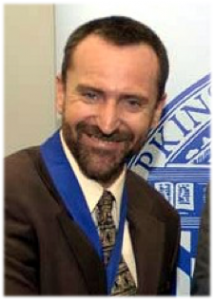
Gabor Fichtinger, Ph.D.
Director of Engineering, Engineering Research Center for Computer-Integrated Surgical Systems and Technologies,
Whiting School of Engineering, Johns Hopkins University
Ameet K. Jain, Ph.D., a former doctoral student of Dr. Fichtinger’s and in 2008 with Philips Research, contributed the following ideas:
“Under Gabor’s mentorship, I went from being a student who nobody thought was capable of doing a PhD to someone who has been able to do well in a short period of time. Today I feel I have become a fully independent researcher. And I owe this all to my advisor who had faith in me and decided to guide me through my years at Hopkins.
“So as to bring some uniqueness in perspectives, I have researched some Indian philosophies on the teacher. Though these values are universal, I think they might add value to your website – in fact reiterating the very universal nature and importance of the teacher across cultures and history. They have been an inspiration to me throughout my life, and might potentially become so for others.
“In the links below, it is critical to interpret ‘teacher’ a bit liberally. …In the Eastern tradition, the teacher-disciple relationship can be considered as the most significant.
“Wikipedia has a good overview and well-organised collection of ideas about what a Guru (teacher) might and might not mean. [An] excerpt: ‘In Indian culture, a person without a guru or a teacher was once looked down on as an orphan or unfortunate one.’
The book, “Guru Dharma (approximately, ‘the path of and from the teacher’), provides another general perspective on the importance of the teacher in traditional Indian philosophy (pages 86-88):
‘Guru is like the creator… He is the one who creates the qualities of shishya (student) in me. …In today’s city life, it is very difficult to find such a guru and also to find such a shishya. Any sadhaka who is very much interested to find the guru also should know the following:
‘Guru is one who initiates the shishya to ask questions. This question-answer session inculcates the habit of finding the true reason of doing a particular thing and also keeps the shishya from blindly following the path without asking questions. This is important as in the Vedic tradition lots of things which were done had some scientific meaning and were not just done for the sake of doing. This also helps the Guru to judge the development of the student.
’Guru is one who does not exploit the shishya for personal gains but gives the shishya some of his energy for the spiritual development of the shishya. Guru is not one who preaches austerity and lives in luxury. …The true Guru is one who is above ego, pride and sentiments, when he gives shaktipata to a shishya he only thinks of himself as a medium, and this also happens only at a time when the shishya as well as the guru are ready…
’Shishya should experiment and find new things so that he is able to gain sufficient knowledge to guide others.’”
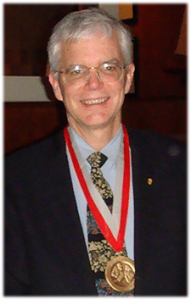
Samuel M. Allen, Ph.D.
Professor of Physical Metallurgy,
Department of Materials Science and Engineering,
School of Engineering, MIT;
Cambridge, Massachusetts
From MIT School of Engineering Dean Subra Suresh: “One of the great pleasures of being dean is having an opportunity to honor the contributions of dedicated faculty – but having an opportunity to award the Capers and Marion McDonald prize to Sam [Allen] is additionally meaningful to me. Sam has been a member of my own, home department – Materials Science and Engineering – for more than 30 years. I have had the distinct pleasure of working closely with Sam during my tenure as head of that department.
“During his 30 years at MIT, Sam has served not only as a teacher and researcher, but also as a skilled advisor of undergraduates, graduate students and junior faculty; an MIT-certified mediator, trained in helping members of the department and Institute community resolve conflicts amicably; and an central participant in numerous Institute committees dealing with academic programs, outreach, and activities beyond the formal classroom. He was among the first MIT faculty members to participate in freshman advising and has served the longest in this capacity.
“Not surprisingly, the letters of endorsement for Sam’s nomination ranged across the entire academic spectrum, from members of the Class of 2011, to former students and colleagues who are now in leadership positions both in the United States and abroad. We are delighted to have the Capers and Marion McDonald Award as a means of honoring him.”
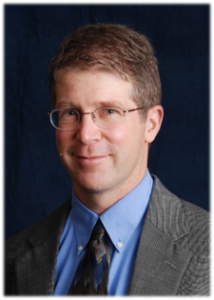
Steven M. Cramer, Ph.D.
Professor and Associate Dean for Academic Affairs,
Department of Civil and Environmental Engineering,
College of Engineering, University of Wisconsin;
Madison, Wisconsin
“I was surprised when I learned I had been awarded the 2008 Tau Beta Pi McDonald Mentor Award. I did not believe that awards were given for such things, and certainly there must be many other mentors at least equally deserving helping others.
“Because education is inherently a people business, mentoring is a professional obligation, and thus development of people in various forms is inherent to the business. But in the long list of professional obligations, mentoring often falls lower on the list. The best mentoring occurs not out of professional obligation but more from personal philosophy and a simple interest in the lives of others.
“Life presents to all of us dilemmas and decisions for which no handbook has been prepared and no class ever taken. The comfort of having someone listen to our challenges helps clarify our own thoughts, and the guidance of another perspective often compensates for our own blind spots.
“Mentoring helps separate our human condition from the bureaucracy of our lives. Mentoring requires patience and empathy. It cannot occur on a schedule and sometimes the response must be prompt.”
The Tau Beta Pi award committee contributed the following accolades:
“Dr. Cramer’s work on campus, both job-related and volunteer, and his respect and support of students, the university, and fellow faculty embodies the ideal of professor as mentor. …An excellent teacher and advisor, Dr. Cramer was cited by students and peers for his years of consistently positive interactions with students and for his work to encourage them to reach their full potential, all of which have established him as an invigorating role model for students, faculty and advisory peers.
“Tributes have been paid to Dr. Cramer’s merits as a teacher, mentor, coach, and role model for students. He is actively involved in the UW-Madison chapter of ASCE and has been advisor to both the concrete canoe and steel bridge teams for more than 10 years. In 2007, the canoe team won its fifth straight national title, and no other school in the 30-year history of the competition has won more than two consecutive national titles. His leadership has been praised for being available to help the students when needed without micro-managing the teams. The mature and gracious attitudes of the winning team members is further testament to his unique capabilities as a mentor. The success has created a positive esprit de corps among students, and has also boosted student interest in engineering and the department. A colleague who has observed hundreds of mentors in similar milieus feels that Dr. Cramer ‘stands head and shoulders above the rest.’
“Dr. Cramer has taken part in diversity initiatives like the school of education’s College for Kids, the Minority Research Apprentice Program, and the graduate school’s Summer Undergraduate Research Experience.
“Dr. Cramer’s students rank his teaching, via student evaluations, as among the best in the department. His classes have a reputation for being technically demanding. His dean describes him as a very gifted teacher who creates a culture of high expectations and high support to help all students succeed. He is a fellow of the UW-Madison Teaching Academy and has received the outstanding professor award from the ASCE student chapter nine times.”
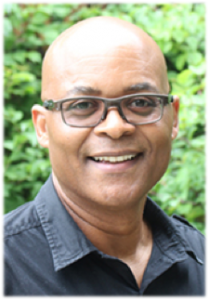
Derrick K. Rollins, Sr., Ph.D.
Professor,
Department of Chemical and Biological Engineering,
College of Engineering, Iowa State University;
Ames, Iowa
Dr. Rollins’ Tau Beta Pi award provided Iowa State University a centerpiece for recognizing his personal story and continuing contributions to the university.
The following was featured on the Iowa State Website during 2012-2014:
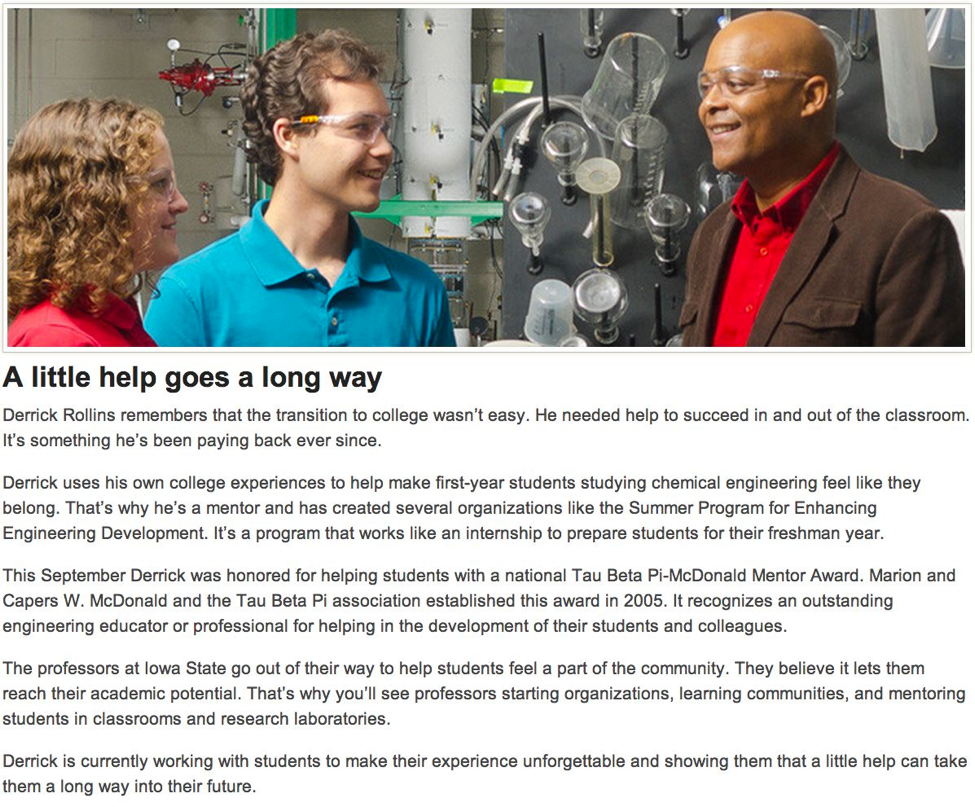
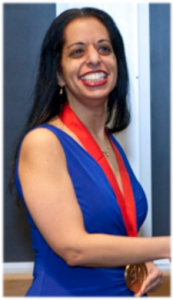
Sujata K. Bhatia, M.D., Ph.D.
Assistant Director for Undergraduate Studies in Biomedical Engineering, School of Engineering and Applied Sciences (SEAS); Assistant Dean, Harvard Summer School,
Harvard University
“I believe in education. I believe that education is critical for the personal development of our students, as well as the international development of our global community. I believe that education has value not only for imparting practical skills and knowledge, but also for encouraging critical thinking and problem-solving. Most importantly, I believe in our students. I believe that I can learn as much from my students as they learn from me. I believe that every single student has the power to change the world.
“Students are the drivers of innovation at any university. When we effectively educate and advise our undergraduate students, we are ensuring the future of the university, as well as the future of our shared planet. Every time I look into the eyes of an undergraduate student, I can see the future. On a professional level, I am in awe of my students’ accomplishments. On a personal level, each student whom I advise touches my heart. These are the reasons that I love my role as an educator and adviser to Harvard students.
“My main priority is to instill students with courage and confidence in their capability to succeed, in their capability to make a difference, in their capability to have a positive impact on the world. When I advise a student, the first question I ask is, “What are your dreams?” If I can convince all of my students to believe in themselves, and to believe in the strength and beauty of their dreams, then I have succeeded as an adviser.
“My philosophy is that an academic adviser must fill multiple roles: guide, teacher, mentor, educational facilitator, and role model. Advising is not merely about the mechanics of course selection and degree completion; rather, advising is about enabling students to thrive in the university environment and to achieve their dreams. As an educator with experience in teaching, academic advising, and residential advising, I can appreciate that students can learn as much outside the classroom as inside the classroom. The academic adviser is one of the first people that a student will meet at Harvard College, and this adviser can be one of the most important figures in a student’s memories of Harvard College.
“Depending on individual background, experiences, values, and life goals, students will have different dreams. Some dream of intellectual pursuits, hoping to learn as much as possible across various academic disciplines; these students place high importance on pursuing a rigorous course load that incorporates diverse fields of study. Others dream of changing the world through public service and social activism; these students place high importance on volunteerism and political involvement. Yet others dream of finding a secure job, one that will afford a comfortable life that was never possible for their parents; these students place high importance on finding a career path. Still others dream of a college experience that will lead to lifelong friendships; these students place high importance on extracurricular and athletic activities. All of these are legitimate dreams, and many students will have a combination of the above goals. Each student will have a unique definition of success, and therefore each student will have a unique college experience. There is no such thing as a singular ‘normal college experience,’ and it is critical for advisers to be open-minded and supportive of various educational pathways, even those that deviate from an adviser’s own educational experience. It is the job of the adviser to facilitate students’ dreams. As a proctor in Harvard Yard, I have served as a freshman adviser for students who aspire to be composers, heads of state, literary scholars, physicians, Olympic athletes, activists, journalists, engineers, theater directors, sustainable farmers, and scientists. Even in my role as a concentration adviser for biomedical engineering, I have served as an adviser for students with talents and interests in the performing arts, diplomacy, economics, and entrepreneurship. In both my residential advising and teaching roles, I have mentored students from diverse parts of the world, including Kyrgyzstan, Canada, Nigeria, Kenya, Zimbabwe, India, Australia, New Zealand, and the United Kingdom. Part of what makes the adviser’s job so thrilling is the variety of students, and the variety of dreams that come true, with the adviser’s guidance and assurance. I treasure my experiences, and I would not exchange these experiences for anything.
“Once an adviser understands a student’s hopes and aspirations, the adviser must encourage the student, and facilitate the student’s transition to college. This requires the adviser to be a good listener, a watchful observer, and most importantly a steadfast supporter. The adviser plays a central role in empowering the student to navigate in a new environment and new phase of life. First-year students in particular face academic challenges with regard to time management, study habits, classroom participation, and research skills. Students will also face personal challenges with respect to homesickness, identity, and self-confidence. Advisers help students to locate necessary resources, discover educational and extracurricular interests, and overcome adversity. Advisers must be well-versed in the services available to Harvard College students, including the Bureau of Study Counsel, Writing Center, Accessible Education Office, University Health Services, and Office of Career Services, to name a few. Students are often hesitant to utilize these resources. The adviser must embolden the student to explore, to ask questions, and to seek out help when necessary. The adviser must observe the student’s progress throughout the year, and the adviser can and should initiate discussions when it is clear that the student could use comfort, assistance, and advice.
“I encourage all advisers to learn about their students on both a professional and a personal level. An adviser can often learn more about a student through everyday activities than through formal advising sessions. I have actively participated in both formal and informal events as opportunities to advise students. As an adviser, I have always been an enthusiastic cheerleader for my students; I watch their performances, I attend their athletic events, I read about them in the Harvard Crimson, and I share holiday meals with them. Informal conversations can reveal much about a student’s individual aspirations and challenges.
“Beyond one-on-one interactions to ascertain each student’s dreams and challenges, the adviser must understand the overall mission of Harvard College, and relate this mission in advising conversations. The goal of a college education is not solely to prepare students for future careers; the goal is to develop creative, passionate individuals who can address pressing global issues. A broad, liberal education is necessary to cultivate both concrete skills and analytical abilities. Increasingly, a multidisciplinary approach is required to solve complex problems, so students should be encouraged to pursue coursework in various fields. Every concentration has social relevance; every concentration can and should be pursued passionately and rigorously; every concentration imparts critical thinking; and every concentration can be applied to meet the world’s most critical needs. Breakthroughs often happen at the intersection of different fields, so a broad-based education is highly important. Likewise, any Harvard course can be part of an intellectually coherent plan of study. While many students will choose to take Harvard’s most popular courses, the undergraduate course catalog includes 3500 courses, and over 900 of these courses enroll 15 or fewer students; for instance, freshman seminars are limited to 12 students. An educator and adviser must motivate students to pursue unique educational paths, and allow students to take advantage of the great variety of educational opportunities at Harvard. In addition, every adviser should be equipped with a list of the Directors of Undergraduate Studies and Assistant Directors of Undergraduate Studies for all 50 concentrations in Harvard College and should readily call on these advisers to aid a student in exploring diverse interests during the freshman year.
“In summary, I believe that an adviser must enable each student’s dreams; understand each student’s challenges; and support each student’s unique educational pathway. As an Assistant Director for Undergraduate Studies in Biomedical Engineering at Harvard, I take responsibility for ensuring that every single student’s dreams come true. Each fall, when I attend freshman convocation, I have a sense of awe and responsibility for Harvard College and its freshman students. I carry this sense of awe and responsibility with me throughout my work, and I am enthusiastic about the unique and wonderful opportunity that I have at Harvard. Enthusiasm must pervade every advising conversation and every advising event. Advisers mold our students, and thereby mold our future world. The current generation of students must be ready to address growing needs in every part of the world. My responsibility is to work productively with all faculty and advisers, and make certain that students are prepared to work across disciplines to face global challenges head-on, with confidence and bravery and pride in their Harvard education.”
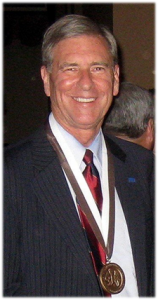
William R. Goodin, Ph.D.
Director, Short Course Program and Technical Management Program,
University of California Los Angeles (UCLA) Extension,
Los Angeles, California
Dr. Goodin’s Tau Beta Pi nomination statement declares, in part, “Bill has provided constant support and counsel to the UCLA Chapter officers and the entire membership… Bill continually offers career advice, job search strategies, and feedback on résumés to many members and is regularly asked to provide letters of recommendation for students pursuing careers and graduate-school opportunities.
“Bill has consistently helped improve the leadership skills of the Tau Beta Pi officers by providing feedback and advice on a variety of issues related to strategic planning, meeting and event planning and logistics, and day-to-day operation of the chapter. He has also extended his support to junior officers and helps them prepare for senior leadership positions.”
The statement also describes how he set up the Tau Beta Pi Alumnus Advisory Board on campus to support the chapter in areas such as career workshops and mock interviews. Other encouragement occurs in coaching areas such as public speaking, leading meetings, creating an environment for people to succeed, and managing the life-work balance.
Dr. Goodin serves as an advisor and mentor to the Society of Women Engineers, which honored him for his steadfast support for advancing women in engineering, and as his SWE region’s outstanding collegiate mentor.
It was said that serving as a faculty advisor and student-group liaison takes up the majority of his weekends and time after work. His concern for students has created a great rapport between them, while his close relationship with the alumni and ties to industry through his extension role bring great benefit to the Tau Beta Pi chapter at UCLA.
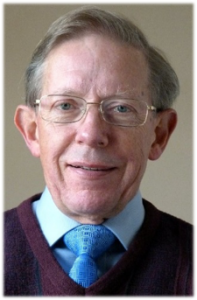
Robert Birkmyre, EUR ING, CEng.
Professional European Engineer (EUR ING),
European Federation of National Engineering Associations (FEANI); Chartered Engineer (U.K.);
BTech in Automotive Engineering, Loughborough University, Leicestershire, U.K.
“In 1999, Robert…became Head of Training and Professional Development for the Motor Industry Research Association (MIRA) in Nuneaton – a role he had always been interested in.
“In 2003 he took early retirement, but rather than put his feet up and enjoy a well-earned rest, Robert decided that he would like to carry on mentoring. In Coventry, he found the Midland Group Training Services which offers a service to companies which do not have the time or resources to mentor in-house. At one point, he had 69 mentees on his books: a combination of undergraduate placement students and long term mentees. He has mentored in a variety of plant schemes around the UK including those at Cummins, SKF, Caterpillar, and the Murco oil refinery in Wales, which have also been very diverse: attracting engineers from Denmark, India, Spain, Portugal and China.
“Robert has been a strong supporter of eMPDS [online career development recording system] since its inception and has absolutely loved it. He explained why: ‘When one of my mentees went to Western Australia on a year’s placement, he could carry on with his chartership. We could talk on the phone, and we could both see everything we needed to online. It all worked very well.’ Jane Noakes, the senior executive for professional development at the Institution commented: ‘Robert’s enthusiasm and commitment to the mentoring process is second to none. His early uptake of the online reporting system and informed feedback have helped us develop the system into what it is today, ie Career Developer.’
“In his lifetime, Robert has seen huge changes in the opportunities for enhanced engineering skills and education. He said: ‘It’s now possible to go from the shop floor to university and then on to the boardroom. What has also been very rewarding to see is the increasing diversity of engineering workforces – this is a really positive change for the better. I always encouraged my mentees to volunteer in local schools as well because companies are always very keen to have these associations.’
“Summing up what the award means to him, Robert said: ‘I have really enjoyed working with these young people throughout my career. I have now fully retired so this award is a wonderful accolade at the end of my working life.’
“Terry Spall FIMechE, the Commercial Director at MIRA, has known Robert for many years, both whilst he worked for MIRA and subsequently since he retired. He was extremely proud of Robert’s achievement, saying: ‘The energy and enthusiasm he has shown in mentoring a very significant number of young engineers successfully towards becoming Chartered has been simply outstanding. I am delighted that his efforts have been recognised in such a high profile manner and he has become the first UK recipient of this international award.’
“Steven Gasser, the Institution’s Senior Business Development Manager agreed, saying: ‘I have known Robert and worked with him at MIRA and Midland Group Training for the last eight years and I have seen at first hand his passion and commitment for the engineering profession. This award is a reflection of the high regard in which he is held by the engineering community. The time and dedication that he has given to the development of Professional Engineers for the future is a testament to his knowledge and determination to apply the highest standards whilst providing an environment that allows the developing engineer to explore their own development and work towards professional registration. I would like to congratulate Robert on this accolade and take the opportunity to thank him for all of his hard work – the Institution and the professional engineering community has benefited greatly from his energy and expertise.'”
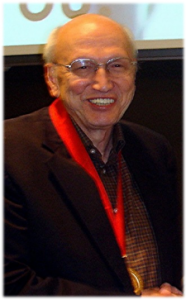
Roger W. Brockett, Ph.D.
Professor of Electrical Engineering and Computer Science,
founder of Harvard Robotics Laboratory,
School of Engineering and Applied Sciences (SEAS),
Harvard University
“Roger Brockett has clearly earned the admiration of his current and former students, who describe him as ‘a big ideas man,’ ‘a role model,’ ‘instrumental,’ and ‘inspiring,’” Dean Cherry A. Murray said. “He continues to play an important role in their professional development, in some cases decades after they have earned their degrees.”
“Roger Brockett has made enormous contributions to mentoring, advising, and development of both undergraduate and graduate students at Harvard,” says Vahid Tarokh, a close colleague of Brockett’s who is Perkins Professor of Applied Mathematics…at SEAS. “He is truly well deserving of SEAS’ recognition of his contributions.”
“What I find most interesting about Roger’s mentoring of his graduate students is that the mentorship does not end with the student’s graduation,” says Tarokh. “In every manner, his career matches perfectly the criteria for the award.”
“Brockett…began his teaching career at the Massachusetts Institute of Technology (MIT) in 1963, joining the Harvard faculty in 1969. He delivered his final lecture here earlier this week and will now retire from teaching. …Over the course of his career, Brockett has mentored more than 60 Ph.D. students, about 50 of them at Harvard, consistently guiding their research toward seminal dissertations that defined new fields within control and systems theory.
“In 1983, he founded the Harvard Robotics Laboratory (HRL), which today continues its research in areas such as robotic manipulation and control of quantum systems. HRL created new opportunities for undergraduates to take part in engineering and mathematics research, and Brockett has supervised many of their senior theses. …His generous open-door policy, both figurative and literal (he once lost a laptop from his office while speaking with a group of students nearby), applies to undergraduates, graduate students, and colleagues alike.
“Navin Khaneja…came to Harvard as Brockett’s Ph.D. student and found a home at SEAS; he is now Gordon McKay Professor of Electrical Engineering. …Through effective teaching, prescient research, and accessible writings; and through his decisions regarding curricula and teaching and research appointments, Khaneja says, Brockett “has had a major influence on the culture of SEAS.”
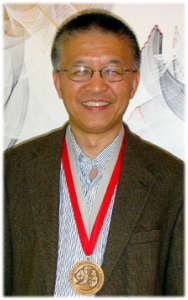
Gang Chen, Ph.D.
Professor of Power Engineering;
Director, Pappalardo Micro and Nano Engineering Laboratories,
Department of Mechanical Engineering,
School of Engineering, MIT
“I consider Gang to be many things: an ambitious visionary, a brilliant academic scholar and an inspirational leader just to name a few. However, I think the quality that truly defines Gang is his tireless and unyielding effort to teach and mentor students, from high school through graduate school. His love of science and engineering and his dedication towards his field are certainly well known amongst many. But, for those fortunate to work in close concert with him, it is his desire for all of us to learn and engage in science and engineering and his willingness to explore our own curiosities and ideas that truly set him apart.” — Jonathan K. Tong, second year Master’s candidate, Spring 2011.
